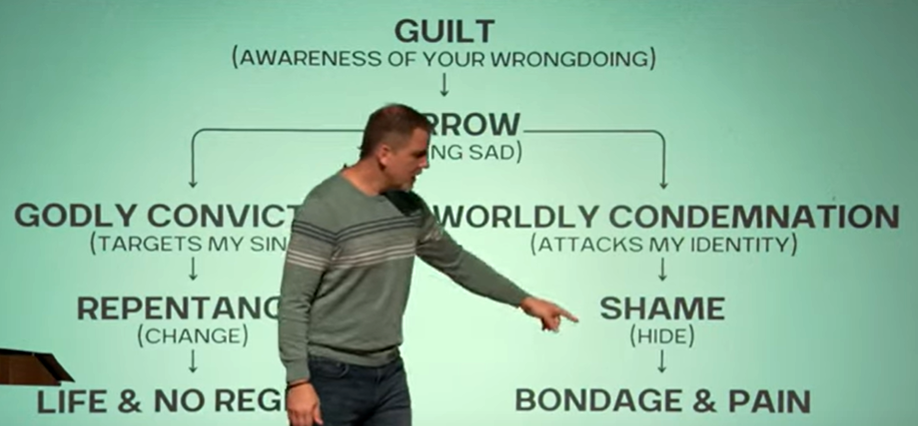That Hurt: You (Guilt)
April 28, 2024Pastor Patrick presented today's message, "That Hurt: God's People." Here's a video of the message.
It wasn't until 15 years ago or so that I started to hear the term "convicted" used with regularity at church or amongst Christians generally. It was when we started attending and socializing with evangelical churches and people.
However, there are plenty of times when the Old Testament mentions that people are aware of their sins and sometimes looking for ways to repent. In Genesis 44:16, Joseph's brother Judah (the name from which comes Judaism) is asking God "what can we say?" They knew they were "convicted" (caught red-handed and knew it).
Even the Pharoah, however sincerely, recognized his sin and asked for forgiveness in Exodus 10:16-17, "Pharaoh quickly summoned Moses and Aaron and said, 'I have sinned against the Lord your God and against you. Now forgive my sin once more and pray to the Lord your God to take this deadly plague away from me.'" Of course, "take the deadly plague from me" probably gives away his real motivation.

Many people think that in the Old Testament salvation came from observing all the laws. But that would not be correct. Salvation came from knowing the law, recognizing when you have sinned, repenting, and having faith in God. This pattern is not dissimilar to Patrick's in his message (see chart above): Guilt to Sorrow to either Conviction, the Godly path, or Condemnation, the Enemy's path.
By the way, the words of the Old Testament that deal with salvation are not always clear. It's much like the simple word "saved" can have several meanings depending on the context (saved for eternity, saved your dog, saved for later, etc.). As Bible.org points out, there are 15 different words in the Old Testament that can be used for salvation. These mostly refer to deliverance from enemies, death, and other troubles. Some of these (about 58 uses throughout the OT) reference the coming Kingdom. "Credited with righteousness" is another expression for being saved or repentant.
The Day of Atonement, Yom Kippur, is all about recognizing one's sins, repenting, and asking forgiveness. See Leviticus 16.
Bonus
Joseph's "Technicolor Dreamcoat"
The Hebrew expression used for Joseph's "robe of colors" uses "tunic" (kethonet, כְּתֹנֶת) and "vari-colored" (pas, פַס). The expression is used in only one other place in the Old Testament to describe the dress of virgin princesses (2 Samuel 13:18). Robert Alter notes that the expression is used somewhat commonly in other documents and indicates the expression describes a unisex garment and a product of Haute Couture (custom, high-end clothing). From the Hertz commentary we read that paintings at the time showed rulers and chiefs, including Semitic chiefs, in such coats of many colors.
Jacob, in giving this coat to Joseph, is already marking his near-youngest son for chieftainship of his clan following his death. No wonder the elder brothers were ticked.
Bonus2
Jacob's New Name Israel - What Does It Mean?
Below is a direct quote from Leon R. Kass' book, The Beginning of Wisdom: Reading Genesis. I use it for several reasons. In the past I mostly indicate that Israel means "struggle with God." I like the notion that following God is not an easy thing to do but worth the effort. It's OK to struggle with what God says and does. The struggle usually brings about new and often better understandings. But, as Kass points out here, there is often ambiguity in how something should be or could be translated. Pondering each of the potential understandings often leads to further ah-ha moments. Here's the quote from Kass (page 460):
But like so much else in this story, the precise meaning of the name Yisra'el is unclear, perhaps intentionally so. If Jacob is the verb's subject and God its object, the name could mean "champion or prince [sar] of God," one who contends with the support of, or on behalf of, God; or it could mean "striver with or against God," one who contends with or against God; or again, ruler or prince over God," one who gains victory over, who prevails against, a divine being. Alternatively, God rather than Jacob could be the subject: the name would then mean something like "God rules" or "God prevails." The explanation offered by the man for the new name does not remove the ambiguities. The verb translated "striven," (samh) is a primitive root whose suggested meanings are said to include "to prevail" and "to have power as a prince." Hence, Robert Sacks translates, "For as a prince hast thou power with God and w1th men, and hast prevailed," though the more common translation is as given above. Of the many possible ways of combining the name and the explanation, one is especially suggestive: Jacob, who prevails as a prince with God and man, carries in his new name a teaching that it is God, after all, who rules.The footnote (from Robert Alter) indicates that the "el" (the "God" part, as in beth-el, House of God) at the end of a name can generally make the name the subject of the sentence. Alter also observes that the etymology could indicate a meaning of "He strives with God." Striving is a little different from struggling and is equally ponderable.
It's a great book, full of such intricate explanations of texts in Genesis. The book is close to 700 pages and has taken me quite a while to get through. But totally worth it!